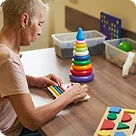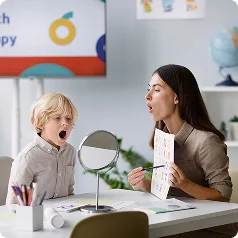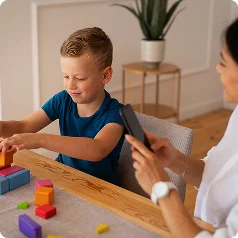Welcome! Let’s Answer Your Questions About Therapy
You’re not alone - navigating therapy can feel overwhelming at first. Whether you’re here for your child, a family member, or yourself, we’ve broken down the most common questions into quick, helpful sections.

What is Therapy?
Understand the basics: the different types of outpatient therapies (like speech, occupational, behavioral/ABA, physical therapy, audiology), what they help with, and how to know if therapy might be right for your situation.
Therapy is professional support that helps people improve how they move, talk, think, behave, or interact with the world. It’s often used when someone is facing delays, disabilities, or health challenges – but it’s also for anyone who needs support gaining new skills or recovering from injury or illness.
Types of Therapy Covered in the Platform:

Physical Therapy (PT)
Improve strength, mobility, balance
Example: A child who struggles to say certain sounds or an adult recovering from a stroke.

Occupational Therapy (OT)
Build everyday skills, fine motor, self-care
Example: A child with sensory sensitivities or a senior who needs help after surgery.

Speech Therapy (SLP)
Improve communication, speech, feeding
Example: A baby with low muscle tone or an adult recovering from a fall.

Autism Therapy (ABA)
Manage behavior, autism support, social skills
Example: A child with autism learning how to handle frustration and communicate needs.

Audiology
Hearing tests, hearing aids, auditory processing
Example: A child who needs help hearing clearly in noisy environments.
Florida is an open access state, which means you do not need a doctor’s referral to begin most types of outpatient therapy. While an official diagnosis or medical referral IS important for insurance billing, school accommodations, or long-term care planning, there’s no downside to getting started early. Starting therapy before you have everything in place helps you avoid delays, gather information, and build a support team – all while laying the groundwork for progress. Early action leads to better outcomes, and we are here to help you take that first step with or without a referral.
How Therapy Works
Step-by-step overview of the therapy journey: from first appointments and evaluations to setting goals, ongoing sessions, and measuring progress. Get a feel for what to expect and how to prepare.
Types of Therapy Covered in the Platform:
Screening or Concern
A teacher, pediatrician, or parent notices a delay or challenge (speech, behavior, walking, etc.).
Referral or Evaluation
You may be referred to a therapist or request an evaluation directly.
Assessment Session
A licensed therapist evaluates the individual’s strengths and challenges using play, conversation, or testing.
Treatment Plan
You’ll receive a plan with clear goals (e.g., “say 5 new words,” “tolerate brushing teeth”).
Therapy Sessions Begin
Sessions typically happen 1–3x/week, and may be in-person, at school, at home, or virtual.
Family Involvement
Good therapy includes education for parents or caregivers.
Ongoing Tracking
Progress is reviewed regularly, and goals are updated as needed.
Therapy can be expensive – but it doesn’t have to break your budget. Learn what’s typically covered by insurance, what co-pays or out-of-pocket costs may arise, and how we are helping families find financial aid, grants, and better-fitting plans.
The Costs Associated
Step-by-step overview of the therapy journey: from first appointments and evaluations to setting goals, ongoing sessions, and measuring progress. Get a feel for what to expect and how to prepare.
Therapy costs can vary widely – but understanding them upfront helps you plan and avoid surprises.
How We Helps:

Search by insurance accepted
Avoid wasting time calling around

Use our Cost Calculator
Get an estimate of weekly, monthly, and yearly therapy costs

Access our Financial Aid Hub
Match with grants, vouchers, or sliding-scale providers

Review insurance plans
Find a better-fitting plan during open enrolment
Don’t give up. We’ve helped families find $500 to $5,000 in grants or discounts. We’ll show you how to apply and advocate for coverage.
Therapy Frequency, Length, and Duration
Don’t give up. We’ve helped families find $500 to $5,000 in grants or discounts. We’ll show you how to apply and advocate for coverage.
Each person’s therapy needs are different – but here’s what’s typical.
As progress is made, frequency may drop. We help you track appointments and outcomes so you and your provider know what’s working and when to adjust.
Don’t Panic - Therapy is Common
You're not alone. More than 1 in 6 children receive developmental therapy, and millions of adults benefit from support for communication, mobility, and daily living. It’s normal to feel unsure - but therapy is a powerful tool used by millions every year.
Needing therapy does not mean something is wrong with you or your child – it means you’re getting the support needed to thrive.
Just How Common?
1 in 6 children
In the U.S. receives developmental therapy
240%
Autism diagnoses up in the past 20 years
10%
Preschool-aged children affected by speech delays
1 in 4 adults
Over 65 use PT or OT
1 in 2 families
Caring for a child or senior will seek therapy at some point
Therapy is common in schools, hospitals, senior centers, and homes. It’s a tool – not a label. Most people won’t even know someone is receiving therapy unless they share it.
It’s okay to feel nervous. But therapy today is normal, respected, and often life-changing. Starting therapy is a sign of love, not failure.
Why Therapy is Important
Therapy helps people gain independence, improve communication, manage behavior, and build lifelong skills. Starting therapy early can reduce long-term challenges, improve quality of life, and build confidence - for patients and caregivers alike.
Therapy can change a life – sometimes dramatically.
What Therapy Can Do:

Build Communication
A nonverbal child can express themselves

Improve Mobility
An aging adult can walk without fear of falling

Manage Behavior
A child can focus in class or avoid meltdowns

Support Daily Tasks
Feeding, dressing, handwriting, or using a hearing aid
Therapy is about improving function, independence, and confidence – while reducing stress for caregivers and preventing larger health or academic problems later.
The earlier you start, the more progress you can make. But it’s never too late – therapy helps at every stage of life.
Ready to Get Started?